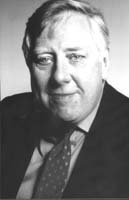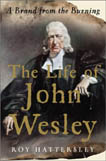A Biographer Forever
 The idea of writing a book about William Booth was, improbably enough, put to me at the 1997 annual dinner of the South Yorkshire Engineering Employers Federation. The chairman – having drunk the loyal toast in water – explained to me that I had not been invited to propose the health of the federation because of my speaking skills. He had thought that the dinner would be an ideal occasion to explain that the Salvation Army – about to convert its history department into a heritage centre – had discovered some original Booth papers. He, and several other lay members of the Army, thought that I might like the first chance to see them and write about “The Founder”.
The idea of writing a book about William Booth was, improbably enough, put to me at the 1997 annual dinner of the South Yorkshire Engineering Employers Federation. The chairman – having drunk the loyal toast in water – explained to me that I had not been invited to propose the health of the federation because of my speaking skills. He had thought that the dinner would be an ideal occasion to explain that the Salvation Army – about to convert its history department into a heritage centre – had discovered some original Booth papers. He, and several other lay members of the Army, thought that I might like the first chance to see them and write about “The Founder”.
Apparently my engineering host had read my three novels – all of which were written in the style of ‘English realism’. The trilogy began in Victorian England and his original idea – as he put to it me – was that I should write another novel, in the same genre, with William Booth as the hero. The notion of Salvation Army fiction had no attraction. But the chance of examining the previously unseen documents was irresistible. I promised to “find out something” about William Booth and keep in touch.
I suppose I took the easier route to end my ignorance. I read William Stead’s monograph on Booth and the Victorian poor. Stead – one of Victorian England’s most controversial, as well as most distinguished journalists – described both the Salvation Army’s work amongst the destitute and Booth’s plan for ending poverty forever. In Darkest England -in part a satire on Stanley’s Through Darkest Africa – was a hopelessly utopian prescription for putting the unemployed back to work and increasing the earnings of the labouring poor. But it was the first attempt to set out a wholesale remedy for what, until then, had been universally regarded as an act of god. It seemed worth a book in itself. Booth and the Victorian Poor is what I decided it should be.
I began by working my way though the Booth correspondence in the British Library – placed there, after her death, by Commissioner Catherine Bramwell-Booth who, in her ninetieth year, became a star of the Parkinson Show. To my astonishment the Library’s rules had not changed since I first worked there in 1955. Only pencils can be used. Books must still be kept at the angle on the table which is thought most likely to prevent spinal injury. Even more surprising were the letters themselves. William Booth – one of the most strong willed and didactic men in Victorian England – received constant instructions and injunctions from Catherine Mumford, his fiancé and eventually his wife. And he accepted them without reservation. Only once did the letters reveal dispute. When William expressed doubts about women’s place in the church, Catherine told him that she could not marry a man with such prejudiced views. He immediately changed his theological opinion.
The letters convinced me that a biography of William Booth would, at best, be only half the story. It seemed obvious from the early correspondence that Catherine possessed the potential to be one of the most extraordinary women of the nineteenth century.
What I subsequently learned about her convinced me that my early assessment had done her less than justice. She was the most extraordinary woman of the nineteenth century. Self taught, for her mother regarded school as a potentially corrupting influence, she was able to challenge and defeat the most distinguished Methodist theologians of her day when they claimed with St Paul that ‘in church a woman should remain silent’. As her husband moved from Methodist Connexion to Connexion and eventually created his own autonomous church she supported him both morally and materially. For years, as he struggled on, her lectures provided the income on which the family lived. At the same time she kept his house and bore his children in the manner of a proper Victorian wife and mother.
Without Catherine Booth – whose intellect and determination were far greater than her husband’s – there would have been no Salvation Army. And after it was formed, had it not been for her, the great emphasis it placed on relieving poverty and saving “fallen women” would have taken second place to arcane arguments about the nature of faith and the certain path to salvation. So I wrote Blood and Fire:The story of William and Catherine Booth and their Salvation Army. Had the pronoun not been plural, the title and the book would have told less than the truth.
 Right:Roy Hattersley is the author of many books of biography, commentary and fiction. A revised paperback edition of his acutely observed autobiographical memoir, A Yorkshire Boyhood, is now available (Little, Brown, £10.99).
Right:Roy Hattersley is the author of many books of biography, commentary and fiction. A revised paperback edition of his acutely observed autobiographical memoir, A Yorkshire Boyhood, is now available (Little, Brown, £10.99).
When William Booth died, The Times – which had run campaigns against him ever since the Salvation Army became a force in Britain – could still not bring itself to call him “General”. But, perhaps thinking that it was more a criticism than a compliment, it called him the natural theological heir to John Wesley. The Booth biography had already required me to find out something about Wesley and the times in which he had lived. Two conclusions had followed. One was that the eighteenth century was a great deal more exciting than I – previously an enthusiast for the nineteenth – had realised. The other was that Wesley, like Booth possessed the characteristics which I most admire. Both men held absolutely unwavering convictions and concluded, from their passionate beliefs, that they had a moral duty to evangelise for what they regarded as the good life.
My view of society is very different from that which was held by Booth and Wesley. I am an atheist. But that does not prevent me from admiring the strength of their different convictions. Nor did it stop me from realising the crucial part that Wesley’s “respectable” Christianity played in the development of modern Britain. After Booth, Wesley was the obvious subject for my next biography. I toyed with Pugin, T.E. Lawrence and William Stead – none of whom appealed to my publisher. Wesley did. Their enthusiasm was increased by the discovery that in 2003 – the year in which the paperback will be published – is the tercentenary of his birth and that Wesley events will be held all over Britain. Mine was confirmed by reading some of the biographies which had already been written about him.
It is in no way to diminish the work of Wesley’s scholars -Rack in England Heizenrater and Baker in America – to say that their books are not the sort of thing you are likely to find in your local Waterstone’s store. Their work, although essentially academic, is also, to a degree, devotional – written on the clear understanding that the authors share the religious vision of the subject Wesley deserved a secular biography, even though there is constant surprise that an atheist has written one. I am constantly asked how it is possible to write about a religious leader whose views I do not share. My invariable answer is that no one feels surprised to find a book about George Stevenson written by a man who is not an engineer. Nobody complained when I wrote a biography of Nelson that I was not a sailor. We look at religious leaders as if they are second-rate saints rather than first-rate men.
I have no doubt that, whatever its merits, A Brand from the Burning, my biography of Wesley, is the story of a great man. His greatness is certainly in part the product of his faith. But it was not limited to the effect which he had on the Methodists who followed him or on the churches which he stimulated to greater life by his greater example. I wanted to write a biography of Wesley as I might have written a biography on any other crucial figure in British history. Of course I wanted it too be ‘theologian proof’. That is why I sweated for months over the tracts and texts of Protestantism in general and Methodism in particular. It is also why I persuaded two clergymen with academic inclinations – one Anglican and one Methodist – to read through the drafts. But the book is aimed at every sort of serious reader. All Methodists are welcome, but it is not their exclusive property.
 Left: A Brand from the Burning:The Life of John Wesley is published by Little, Brown.
Left: A Brand from the Burning:The Life of John Wesley is published by Little, Brown.
I think that Booth and Wesley have, between them, made me a biographer for ever. Indeed, I am already contracted with my publisher to write a joint biography of Robert and Elizabeth Browning. But then Little, Brown had a bright idea which they (easily) persuaded me to accept – even though it pushed the Brownings into 2004. The Edwardians – the story of a generation – has to be finished by 2003. It will, of course, describe the remarkable events of the extraordinary years between the beginning of the twentieth century to the outbreak of the First World War. But the beginnings of the welfare state, the suffrages movement, Scott’s last expedition, the transformation of empire into commonwealth and revolution in the British theatre will be interlaced with the comments of ‘ordinary people’ on these great events.
Copyright Roy Hattersley 2005.

Comments